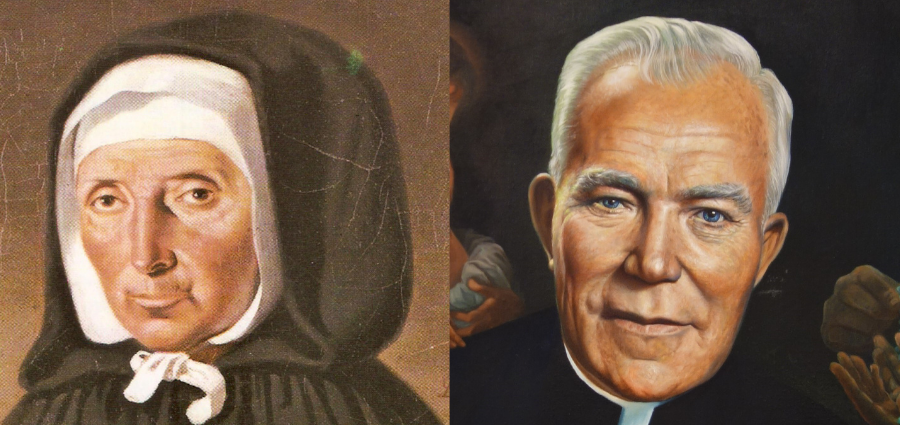
By: Nicole O'Leary on August 30th, 2021
Saint Jeanne Jugan and Venerable Patrick Peyton: To God, With Empty Hands
The threshold between life and death is a place of radical poverty. For popes and for princes, for celebrated millionaires and for unknown derelicts, death demands the same absolute dispossession that delivers the soul into the hands of God. Embracing such poverty is fearful and repugnant to many. For those who have exercised their hearts in the desire for heavenly things, however, it can be a moment of liberation and, even, of joy.
Such is the case for the saints. By all accounts, it seems that such was also the case for Father Patrick Peyton. Although his charming brogue and magnetic presence had won him the affection of millions, Father Peyton always lived in humble dependence on God, relying on Providence for the provision of his apostolate and attributing its success to Mary’s maternal solicitude. Consequently, at the moment of death, Father Peyton could commend himself to God with the same trusting abandonment that had characterized his life.
It was the evening of June 2, 1992. Father Peyton lay in a sickbed in San Pedro, California, where he had taken up residence with the Little Sisters of the Poor. Here he spent the final months of his earthly life, experiencing once again the warmth of a “Rosary home” reminiscent of the childhood home which inspired his Family Rosary apostolate. In her account of his final hours, Mother Mary Anthony, the superior of the San Pedro home, recalls the Sisters praying the Rosary and singing Marian hymns at Father Peyton’s bedside. After they prayed the Memorare, Father Peyton said clearly,
“Mary, my Queen, my Mother.”
The Little Sisters watched with him into the morning hours, until, at 5:20, “Mary gently called her faithful son home.”
More than one hundred years earlier, another soul had returned to God with comparable simplicity and even greater anonymity. The humble Frenchwoman for whom the San Pedro home was named, Saint Jeanne Jugan (known in religion as Sister Mary of the Cross), had founded the Little Sisters of the Poor in 1839. Jeanne closed her eyes forty years later, anticipating the sentiments of Father Peyton’s heart in her own last words:
“O Mary, my dear mother, come to me. You know that I love you and that I long to see you.”
Jeanne’s death took place in obscurity; she had surrendered the title of foundress to a power-hungry priest not long after the establishment of the congregation. Subsequently, she was sent to the motherhouse, where she completed her days in quiet retirement among the novices. By an undeniable act of Providence, Jeanne’s exile enabled her to transmit her founding charism to the future of the congregation—though they knew her only as the elderly Little Sister with the walking stick.
Although Father Peyton was born three decades after Jeanne’s death, an examination of these two lives reveals the spiritual affinity which allowed them both to live and to die with perfect abandonment. Before her exile, Jeanne spent herself in apostolic labors, traveling throughout northern France to make new foundations and to rescue homes in financial trouble. Like Father Peyton’s Family Rosary apostolate, the congregation that God had established through Jeanne blossomed quickly. More and more elderly persons sought refuge from poverty and loneliness in the Sisters’ loving care; meanwhile, vocations poured in to meet the need. Jeanne’s success was evident to all, but her heart was so fixed on God that she seemed impervious to her growing fame. She continued as the intrepid “collecting Sister”—that is, a Little Sister tasked with receiving donations for the provision of the homes—and thus her life became, during these and subsequent years, a hymn to Divine Providence. “God has blessed me because I have always thanked His Providence,” she would say. Later, she would enjoin the novices: “We must always say, ‘Blessed be God! Thank You, my God! Glory be to God!’”
Childlike trust and perpetual gratitude likewise marked Father Peyton’s ministry from the moment of its establishment to the founder’s final days in San Pedro. His audacious enterprises and his dealings with Hollywood personalities never diminished the modesty with which he carried himself. Like Jeanne, Father Peyton was willing to endure humiliation in the service of Our Lady; like Jeanne, he entrusted the spiritual and material success of his work to Providence. “I fight for the Rosary not as a fanatic or a lunatic,” Father Peyton said, “but with the knowledge that if I have Mary’s hand knocking with mine, if I have her eyes searching with mine, then the door will open and we will find what we need.” Five-hundred and forty Rosary rallies later, there could be no doubt: Mary’s hand was knocking with Father Peyton’s, and her Son had thrown the doors open wide.
The habitual attitude in which these two Christians lived is not the privilege of a chosen few; rather, it reflects the objective state of every soul before God. It is, in fact, the plain, unadulterated truth about what it means to be a creature. Death reveals this starkly, but it is true throughout life: we are dependent on our Creator, for “He is before all things, and in Him all things hold together,” (Colossians 1:17). What is distinctive about the saints, however, is that they do not flee from reality, nor attempt to anesthetize themselves to it. Their encounter with their own poverty is a simultaneous encounter with God who is love, whose goodness holds us in existence, and who calls us forth from this life that we might be with Him for all eternity.
Happy feast day, Saint Jeanne Jugan! United in heavenly friendship, you and Father Peyton now gaze upon Mary whom you so longed to see. Pray for us: that our lives, too, become ceaseless hymns of thanksgiving and praise.
